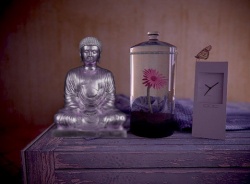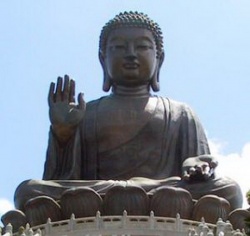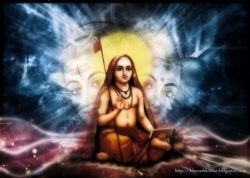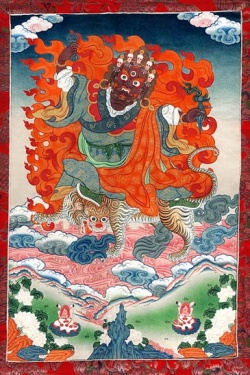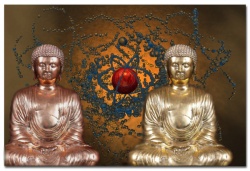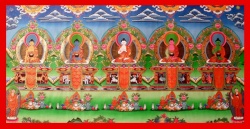Nirvana Sutra: Chapter Five: On the Adamantine Body
Mahayana Mahaparinirvana Sutra
Translated by KOSHO YAMAMOTO
FROM Dharmakshema's Chinese version
The World's genuinely first-ever web edition of this complete scripture
(This "Yamamoto/page edition" is Copyright of Dr. Tony Page, 2004 )
The Complete Kosho Yamamoto English Translation of the "Nirvana Sutra", edited and revised by Dr. Tony Page, typographically improved by Jay and Gabriele Mazo
Chapter Five: On the Adamantine Body
“Then the World-Honoured One said to Kasyapa: "O good man! The body of the Tathagata is one that is eternal, one that is indestructible, and one that is adamantine, one that is not sustained by various kinds of food. It is the Dharma-Body." Kasyapa said to the Buddha: "O World-Honoured One! We do not see such a body as you speak of. What we see is one which is non-eternal, destructible, of dust, one sustained by various kinds of food. How? In that you, the Tathagata, are now about to enter Nirvana." The Buddha said to Kasyapa: "Do not say that the body of the Tathagata is not strong, can easily be broken, and is the same as that of common mortals. O good man! Know that the body of the Tathagata is as indestructible as that which stands for countless billions of kalpas. It is neither the body of man or heaven, not one that fears,
not one sustained by various kinds of food. The body of the Tathagata is one that is not a body and yet is a body. It is one not born and one that does not die. It is one that does not learn or practise. It is one innumerable and boundless and one that does not leave any tracks behind. It knows not and has no form to represent it. It is one ultimately pure. It does not shake. It does not receive, nor does it do (act). It does not abide, does not make. It is tasteless and unmixed. It is an "is" and yet is not something created. It is
neither action nor fruition (i.e. it is beyond Karma). It is not one made, not one that dies. It is no mind; it is one not countable (whose dimensions can be reckoned); It is the All-Wonderful, the one Eternal, and the one not presumable. It is not consciousness and is apart from mind. And yet it does not depart from mind. It is a mind that is all-equal. It is not an "is"; yet it is what is "is". There is no going and no coming (with it); and yet it goes and comes. It does not break up. It is one indestructible. It
does not snap and does not cease. It does not come out, nor does it die out. It is no master and yet a master. It is not one that exists; nor does it not exist. It awakes not, nor does it see. It is no letter, and is not no letter. It is no dhyana (meditation) and is not no dhyana. It cannot be seen and can be well seen. It is no place and yet is a place. It is no abode and yet is an abode. It is not dark and not bright. There is no quietness and yet there is quietness (in it). It is non-possession, non-receiving, and non-giving. It is pure and untainted. It is no quarrelling and is never fighting. It is what is living and is not what is living. It is no taking and no falling. It is no thing and is not no thing. It is no
field of weal and is not no field of weal. It is non-ending and does not end. It is separating and is a total ending. It is Void and is apart from Void. Though not eternal, it is not the case that it dies out moment after moment. There is no defilement and muddling (contamination). There is no letter and it is apart from letters. It is no voice and no talking. It is no practising and learning. It is no praising and no weighing. It is not one and is not different. It has no form or characteristics. All is grand adornment.
It is not brave and is not afraid. It is no quietness and is not quiet. It is heatless and is not hot. It cannot be seen; there is no form to represent it. The Tathagata succours all beings. While not emancipating, he yet indeed emancipates beings. There being no emancipation, there is the awakening of beings. There being no enlightening, he truly delivers sermons. There being not two, he is immeasurable and is incomparably equal. Being as flat as space, there is no form to represent (him). Being equal to the nature of beings, he is not the "not-is", nor is he the "is". He always practises the One Vehicle. He sees the three of beings and does not retrogress, does not change, and cuts
off all the roots of illusion. He does not fight or touch. He is non-nature and yet abides in nature. He does not merge and does not disperse. He is not long and not short. He is not round and not square. He is no skandha, sphere or realm, and yet he is the skandha, sphere, and realm. He is non-increasing and is not a lessening. He is no victor, and yet is one not vanquished. The body of the Tathagata is perfect in such innumerable virtues. There is none that he knows, none not known. There is none that is seen and none that is not seen. It is not that there is any creating and not that there is no creating. It is non-world and is not non-world. He does not do and is not non-doing. He is none to depend
upon and is not none to depend upon. He is not the four great elements, nor is he not the four great elements. He is no cause and is not no cause. He is no being and is not no being. He is no sramana, no Brahmin. He is the Lion, the Great Lion. He is nobody and not nobody. We cannot express. Other than the oneness of Dharma, no counting is possible. At the time of the Parinirvana, he does not enter parinirvana. The Dharma-Body of the Tathagata is perfect in all such innumerable, wonderful virtues. O
Kasyapa! Only the Tathagata knows all such phases (aspects, modalities) of existence. All (this) is beyond what sravakas and pratyekabuddhas can know. O Kasyapa! The body of the Tathagata is composed of all such virtues. It is not a body maintained or nourished by various foodstuffs. O Kasyapa! The virtue of the true body of the Tathagata is such. How could it suffer from illnesses, the pain of illness, and insecurity? How could it be as brittle as an unfired piece of earthenware? O Kasyapa! The
reason why the Tathagata manifests illness and pain all comes from his desire to subdue beings. O good man! Know now that the Tathagata's body is one that is adamantine. From now on, think exclusively of this signification. Never think of a body sustained by food. Also, tell all beings that the body of the Tathagata is the Dharma-Body."
Bodhisattva Kasyapa said to the Buddha: "O World-Honoured One! The Tathagata is perfect in all such virtues. How could it be that such a body could suffer from illness and pain, impermanence, and destruction? Henceforth I shall regard the Tathagata's body as of the eternal Dharma-Body and the body of peace. Also, I shall speak of it to all others as such. Yes, indeed, the Tathagata's Dharma-Body is adamantine and indestructible. And yet, I do not know how it could come to be thus." The
Buddha said to Kasyapa: "By correctly upholding Wonderful Dharma, one obtains this adamantine body. O Kasyapa! As I have in the past well guarded Dharma, I am now blessed with perfecting this adamantine body, which is eternal and indestructible. O good man! One who upholds Wonderful Dharma does not receive the five precepts and practise deportment, but protects with the sword, bow, arrow, and halberd those bhiksus who uphold the precepts and who are pure." Bodhisattva Kasyapa said to the
Buddha: "O World-Honoured One! If a bhiksu is unprotected, living alone in the open, in a graveyard, or under a tree, I say that such a one is a true bhiksu. Any bhiksu whose eyes turn to protection is, we may know, a bogus priest." The Buddha said to Kasyapa: "Do not say "bogus". There may be a bhiksu who goes where he will, satisfies his personal needs, recites sutras, sits, and meditates. Should anyone come and ask about the Way, he will bestow sermons. He will speak about giving, observing the precepts, virtuous
acts, and say that one should desire little and be satisfied. But he is not able to raise the lion's roar of the doctrine, is not surrounded by lions, and is not able to subdue those who do evil. Such a bhiksu cannot realise his own profit, nor is he able to assist others. Know that this person is indolent and lazy. Though he may well uphold the precepts and stick to pure actions, such a person, you should know, can do nothing. Or there may be a bhiksu whose utensils may be full. And he upholds the prohibitive precepts, and
always utters the lion's roar, and delivers wonderful sermons on such as the sutras, geya, vyakarana, gatha, udana, itivrttaka, jatakas, vaipulya, and adbutadharma. He thus expounds these nine types of Buddhist sutras. He bestows benefit and peace upon others. Thus he says: "Prohibitions are given in the Nirvana Sutra to bhiksus which say that they should not keep menials, cows, sheep, or anything contrary to the prohibitions. Should bhiksus keep such defiled things, they must be taught not to. The
Tathagata has stated in the sutras of various schools that any bhiksu who keeps such things must be corrected, just as kings correct bad acts, and must be driven back into secular life." When a bhiksu raises such a lion's roar, anyone who breaks the precepts, on hearing this, will get all angry and harm this priest. If this person dies as a result of this, he is to be called one who upholds the precepts and who benefits both his own self and others. For this reason, kings, ministers, prime ministers and
upasakas protect those who deliver sermons. Any person who protects Wonderful Dharma should learn things thus. O Kasyapa! Any person who thus breaks the precepts and who does not protect Wonderful Dharma is to be called a bogus priest. One who is strict in observance of the rules does not gain such a name. O good man! In the past - innumerable, boundless, asamkhyas of kalpas past - there appeared in this town of Kusinagara a Buddha who was the Alms-deserving, the All-Enlightened One,
the All-accomplished One, the Well-gone, the All-knower, the Unsurpassed One, the Best Trainer, the Teacher of Heaven and Earth, the Buddha-World-Honoured One, and whose name was "Tathagata of Joy-and-Benefit-Augmentation." At that time, the world was wide and gloriously pure, rich and peaceful. The people were at the height of prosperity and no hunger was felt. He (They) looked like the Bodhisattvas of the Land of Peace and Happiness. That Buddha-World-Honoured One stayed in the world for an
innumerable length of time. Having taught the people, he entered Parinirvana between the twin sal trees. The Buddha having entered Nirvana, the teaching remained in the world for countless billions of years and in the last part of the remaining 40 years the Buddhist teaching had still not died. At that time, there was a bhiksu called "Enlightened-Virtuous", who upheld the precepts well and was surrounded by many of his relatives. He raised the lion's roar and preached all the nine types of sutras. He taught, saying: "Do not keep menials, men or women, cows, sheep or whatever might go against the precepts." At that time there were many bhiksus who were acting contrary to
the precepts. On hearing this, they entertained ill-will and came upon this bhiksu, brandishing swords and staffs. At that time, there was a king called "Virtuous". He heard of this. To protect Dharma, he came to where the bhiksu was delivering his sermons and fought against the evil doers so that the bhiksu did not suffer. The king, however, received wounds all over his body. Then the bhiksu, Enlightened-Virtuous, praised the king, saying: "Well done, well done, O King! You are a person who
protects Wonderful Dharma. In days to come, you will become the unsurpassed utensil of Dharma." The king listened to his sermon and rejoiced. Then he died and was born in the land of Buddha Akshobhya and became his foremost disciple. The subjects of this king, his relatives and soldiers were all glad and did not retrogress in their Bodhichitta (resolve to gain Enlightenment). When the day came to depart the world, they were born in the land of Buddha Akshobhya. At the time when Wonderful Dharma is
about to die out, one should act and protect Dharma like this. O Kasyapa! The king at that time was I; the bhiksu who delivered the sermon was Buddha Kasyapa. O Kasyapa! One who guards Wonderful Dharma is recompensed with such incalculable fruition. That is why I today adorn my body in various ways and have perfectly achieved the indestructible Dharma-Body."
Bodhisattva Kasyapa further said to the Buddha: "O World-Honoured One! The eternal body of the Tathagata is one carved in stone, as it were." The Buddha said to Kasyapa: "O good man! For that reason, bhiksus, bhiksunis, upasakas, upasikas should all the more make effort and protect Wonderful Dharma. The reward for protecting Wonderful Dharma is extremely great and innumerable. O good man! Because of this, those upasakas who protect Dharma should take the sword and staff and protect such a bhiksu who guards Dharma. Even though a person upholds the precepts, we cannot call that person one who upholds Mahayana. Even though a person
has not received (in formal ceremony) the five precepts, if he protects Wonderful Dharma, such a one can well be called one of Mahayana. A person who upholds the Wonderful Dharma should take the sword and staff and guard bhiksus." Kasyapa said to the Buddha: "O World-Honoured One! If all bhiksus are to be accompanied by such upasakas with the sword and staff, can we say that they are worthy of the name, or are they unworthy of such? Or is this upholding the precepts or not?" The Buddha said to
Kasyapa: "Do not say that such persons are those who transgress the precepts. O good man! After I have entered Nirvana, the world will be evil-ridden and the land devastated, each pillaging the other, and the people will be driven by hunger. At such a time, because of hunger, men may make up their minds, abandon home and enter the Sangha. Such persons are bogus priests. Such, on seeing those persons who are strict in their observance of the precepts, right in their deportment, and pure in their deeds, upholding
Wonderful Dharma, will drive such away or kill them or cause harm to them." Bodhisattva Kasyapa said again to the Buddha: "O World-Honoured One! How can all such persons upholding the precepts and guarding Wonderful Dharma get into villages and castle towns and teach?" "O good man! That is why I allow those who uphold the precepts to be accompanied by the white-clad people (lay people, non-monks) with the sword and staff. Although all kings, ministers, rich lay men (grhapati) and upasakas may possess the sword and
staff for protecting Dharma, I call this upholding the precepts. You may possess the sword and staff, “but do not take life”. If things are thus, we call this first-hand upholding of the precepts." Kasyapa said: "Anyone who protects Dharma abides in right view and widely expounds the Mahayana sutras. He does not carry the bejewelled parasols of royal persons, oil pots, unpolished rice, or fruit and seeds. He does not approach a king, minister, or the rich for profit. He does not flatter the
danapatis (alms-givers) and is perfect in deportment, and crushes down those who transgress against the precepts and who do evil. Such a person is called a teacher who upholds and protects Dharma. He is a true, good teacher of the Way (kalyana-mitra - a good friend). His mind is as expansive as the sea." "O Kasyapa! Should there be a bhiksu who speaks about Dharma for profit, the people and his relatives will also follow his example and greedily seek profit. This person thus spoils (does harm to) people. O Kasyapa! Of priests there are three kinds:
- 1) the precept-breaking, mixed-up priest,
The precept-breaking mixed-up priest can easily be broken (spiritually injured), whereas the precept-observing priest cannot be broken just by profit.
"How is one a precept-breaking mixed-up priest? A bhiksu may be upholding the precepts, but for profit he sits, stands up, goes and comes with precept-breaking people and is on friendly terms with them and does things together with them. This is precept-breaking, hence, "mixed-up".
"Why do we call a priest ignorant? A bhiksu may be living in a quiet place, but all his sense-organs are not proper (controlled), his mind is dark and slow at working. He desires little and begs alms. On the day of admonition and freedom (pravarana), he does not teach pure confession to all the people; seeing many people breaking the precepts, he does not teach them pure confession. Yet he sits with others, talks about the precepts and seeks to be free. Such a one is an ignorant priest.
"Who is the pure priest? There is a bhiksu, a priest whom 100 thousand-billion Maras cannot break. Now, this Bodhisattva is pure in his nature and can train the two types of priest referred to above and make them live among those who are pure. He is the unsurpassed great teacher, who protects Dharma well, who well upholds the precepts. He knows well what is light or grave in the keeping of the precepts and adjusts and benefits people. He does not know anything that is not (characterised by) upholding the precepts; what he knows is what concerns the precepts.
"What does he do to adjust beings? For example, in order to adjust people, the Bodhisattva always enters a village any time and visits the places where widows and prostitutes live. He lives there for many years. This is what sravakas cannot do. This is what is called adjusting and benefiting beings.
"How does he know what is grave? Now, if one sees that the Tathagata admonishes and prohibits something, one should not do it thereafter. Things such as the four grave offences (killing, stealing, committing sexual misconduct, telling lies) are what the priest must not do. If, contrary to this, he purposely does (such things), this indicates that such a person is no longer a bhiksu, no son of the Shakya (Buddha). This is what is "grave".
"What is "light"? A person commits light ill deeds and is thrice admonished. Then, he stops doing such again. This is "light". We say "non-vinaya which is not proved". A person praises and says that one may receive and take impure things, and says that one accords with the word, and one does not stop doing (this).
"We say "right vinaya which is rightly responded (observed)." This is correctly learning the vinaya (rules of monastic discipline), not drawing near to what is contrary to the vinaya, and spiritually sharing pleasure. Thus one ensures that the vinaya is observed. Thus one well understands what one ought to do as a Buddhist and one expounds it well. This is what the vinaya refers to as well understanding the one letter (i.e. the Chinese written character for vinaya). The same applies to upholding the
sutras. O good man! The Buddha-Dharma is incalculable and hard to fathom The same is also the case with the Tathagata. He is beyond knowing." Bodhisattva Kasyapa said to the Buddha: "O World-Honoured One! It is so, it is so. It is as you, the Holy One, say. Unbounded and incomprehensible is Buddha-Dharma. Thus, too, is the Tathagata. All stands beyond comprehension; so too the Tathagata. Thus, I know now that the Tathagata is eternal and indestructible and that there is no change with him. I shall now study well and expound it widely to people."
Then the Buddha praised Bodhisattva Kasyapa and said: "Well said, well said! The body of the Tathagata is adamantine and indestructible. You, Bodhisattva, now have the right view and right understanding. If you see clearly thus, you will see the adamantine and indestructible body of the Tathagata just as you see things reflected in a mirror."
Source
Continue Reading
- Nirvana Sutra: Chapter One Introductory
- Nirvana Sutra: Chapter Two: On Cunda
- Nirvana Sutra: Chapter Three: On Grief
- Nirvana Sutra: Chapter Four: On Long Life
- Nirvana Sutra: Chapter Five: On the Adamantine Body
- Nirvana Sutra: Chapter Six: On the Virtue of the Name
- Nirvana Sutra: Chapter Seven: On the Four Aspects
- Nirvana Sutra: Chapter Eight: On the Four Dependables
- Nirvana Sutra: Chapter Nine: On Wrong and Right
- Nirvana Sutra: Chapter Ten: On the Four Truths
- Nirvana Sutra: Chapter Eleven: On the Four Inversions
- Nirvana Sutra: Chapter Twelve: On the Tathagata-DHATU
- Nirvana Sutra: Chapter Thirteen: On Letters
- Nirvana Sutra: Chapter Fourteen: On the Parable of the Birds
- Nirvana Sutra: Chapter Fifteen: On the Parable of the Moon
- Nirvana Sutra: Chapter Sixteen: On the Bodhisattva
- Nirvana Sutra: Chapter Seventeen: On the Questions Raised by the Crowd
- Nirvana Sutra: Chapter Eighteen: On Actual Illness
- Nirvana Sutra: Chapter Nineteen: On Holy Actions-1
- Nirvana Sutra: Chapter Twenty: On Holy Actions-2
- Nirvana Sutra: Chapter Twenty-One: On Pure Actions-1
- Nirvana Sutra: Chapter Twenty-Two: On Pure Actions-2
- Nirvana Sutra: Chapter Twenty-Three: On Pure Actions-3
- Nirvana Sutra: Chapter Twenty-Four: On Pure Actions-4
- Nirvana Sutra: Chapter Twenty-Five: On Pure Actions-5
- Nirvana Sutra: Chapter Twenty-Six: On the Action of the Child
- Nirvana Sutra: Chapter Twenty-Seven: Bodhisattva Highly-Virtuous King-1
- Nirvana Sutra: Chapter Twenty-Eight: Bodhisattva Highly-Virtuous King-2
- Nirvana Sutra: Chapter Twenty-Nine: Bodhisattva Highly-Virtuous King (c)
- Nirvana Sutra: Chapter Thirty: Bodhisattva Highly-Virtuous King (d)
- Nirvana Sutra: Chapter Thirty-One: Bodhisattva Highly-Virtuous King (e)
- Nirvana Sutra: Chapter Thirty-Two: Bodhisattva Highly-Virtuous King (f)
- Nirvana Sutra: Chapter Thirty-Three: On Bodhisattva Lion's Roar (A)
- Nirvana Sutra: Chapter Thirty-Four: On Bodhisattva Lion's Roar (b)
- Nirvana Sutra: Chapter Thirty-Five: On Bodhisattva Lion's Roar (c)
- Nirvana Sutra: Chapter Thirty-Six: On Bodhisattva Lion's Roar (d)
- Nirvana Sutra: Chapter Thirty-Seven: On Bodhisattva Lion's Roar (e)
- Nirvana Sutra: Chapter Thirty-Eight: On Bodhisattva Lion's Roar (f)
- Nirvana Sutra: Chapter Thirty-Nine: On Bodhisattva Lion's Roar (g)
- Nirvana Sutra: Chapter Forty: On Bodhisattva Kasyapa (a)
- Nirvana Sutra: Chapter Forty-One: On Bodhisattva Kasyapa (b)
- Nirvana Sutra: Chapter Forty-Two: On Bodhisattva Kasyapa (c)
- Nirvana Sutra: Chapter Forty-Three: On Bodhisattva Kasyapa (d)
- Nirvana Sutra: Chapter Forty-Four: On Bodhisattva Kasyapa (e)
- Nirvana Sutra: Chapter Forty-Five: On Kaundinya (a)
- Nirvana Sutra: Chapter Forty-Six: On Kaundinya (b)
